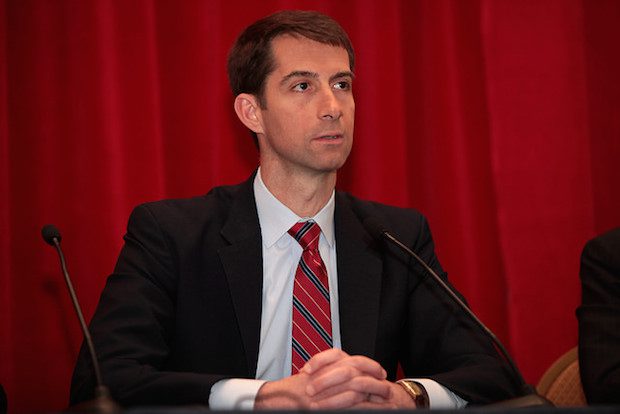Cotton’s Recipe for Unending Conflict

The new issue of The National Interest includes a symposium on the “purpose of American power.” Tom Cotton didn’t answer the question in his contribution, but he did make a number of typically wrongheaded assertions in the process. This was probably the most dangerous one:
And in the Middle East, we must recognize that the objective of destroying the Islamic State is not helped by empowering Iran—the Shia face of the same radical jihadist coin [bold mine-DL]. Stability in the region will not be achieved by enhancing the influence of an actor that has worked for over thirty years to undermine global security.
Cotton’s “two sides of the same coin” claim is misguided for several reasons, but the biggest problem with it is that it treats extremely different sects, groups, and governments as if they were all adherents of a monolithic ideology. Like anticommunists during the Cold War that couldn’t recognize clear divisions between different communist states, hard-liners today go out of their way to ignore the differences and hostility among jihadist groups and to lump together sectarian rivals together as if they were not enemies. Like those same anticommunists, they are oblivious to the rivalries that could be exploited to America’s advantage. Because they view everything in such a distorted way, hard-liners still don’t grasp that our foreign policy doesn’t exist to wage ideological crusades.
This is unfortunately a very common argument among Iran hawks, who insist that the U.S. do more to combat ISIS and also insist that the U.S. should do more to combat the Syrian government and its Iranian ally. The one must be defeated, but the other can’t be empowered in the process, and that is a recipe for a very long and costly (and likely unsuccessful) conflict for the U.S. Michael Brendan Dougherty described their position earlier this week:
It’s just that [Rubio] — and, it turns out, Bush — believe that the United States can actually defeat Assad and Assad’s enemies simultaneously.
In fact, Rubio, Bush, and Graham believe that the only way to defeat one is to defeat the other. Hawkish policy advisers who like the sound of multiple victories at once go back and forth on conspiracy theories as to whether there is some explicit or implicit agreement between Assad’s Shiite regime and ISIS’s rabidly Sunni forces.
These hawks can’t stomach the idea of making a temporary alliance of convenience with ISIS’ most powerful regional enemies, but they also can’t imagine not intervening against ISIS, and so they have concocted the most hare-brained scheme of all: fight all sides at the same time. This is consistent with Cotton’s unwillingness to set priorities or accept trade-offs between them. Cotton once said that the U.S. has to be “focused everywhere,” and it’s clear that he favors the same aimless, unfocused interventionism here as well. Instead of defining the purpose of American power, Cotton displays a desire to fritter away America’s resources on unending conflict.
Comments